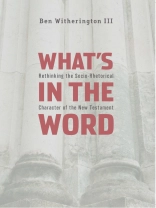Written in clear, and at times colorful, prose, Ben Witherington’s What’s in the Word explains how the recognition of the oral and socio-rhetorical character of the New Testament and its environment necessitates a change in how the New Testament literature is read. Expanding on the work in which he has been fruitfully engaged for over a quarter century, Witherington challenges the previously assured results of historical criticism and demonstrates chapter by chapter how the socio-rhetorical study shifts the paradigm.
Taken together, the chapters in What’s in the Word coalesce around three of Witherington’s ongoing academic concerns: orality and rhetoric; New Testament history, including issues of authenticity and canonicity; and the exegesis of given words in their canonical and socio-cultural contexts. Always unpredictable, this book never fails to pique interest and proffer instruction.
Tabla de materias
Invitation to the Dance
Chapter One : Oral Examination: How Did ‘Oral’ Texts Function in a Rhetorical Culture?
Chapter Two : Canonical Pseudepigrapha–Is It an Oxymoron?
Chapter Three : Rethinking and Redescribing Scribal Culture
Chapter Fou r: The Question of Sermons and Homilies in the New Testament
Chapter Five : Rom. 7.7-25- Retelling Adam’s Tale
Chapter Six : What’s in a Name? Rethinking the Historical Figure of the Beloved Disciple in the 4th Gospel
Chapter Seven : What’s in a Word? Part One: Eidolothuton
Chapter Eight : What’s In A Word? Part Two– Porneia
Chapter Nine : What’s in a Phrase?–‘No Male and Female’ (Gal. 3.28)
Chapter Ten : Christianity in the Making’: Oral Mystery or Eyewitness History?
Chapter Eleven : Rethinking the Canonizing of the New Testament
Chapter Twelve : Sign Posts along the Way–On Taking the Less Travelled Path
Sobre el autor
Ben Witherington III is Professor of New Testament for Doctoral Studies, Asbury Theological Seminary. His publications include Troubled Waters: Rethinking the Theology of Baptism (2007), Making a Meal of It: Rethinking the Theology of the Lord’s Supper (2007), The Living Word of God: Rethinking the Theology of the Bible (2007), and The Problem with Evangelical Theology: Testing the Exegetical Foundations of Calvinism, Dispensationalism, Wesleyanism, and Pentecostalism, Revised and Expanded Edition (2015).







![Portada de Brian Schrag & Julisa Rowe: Community Arts for God's Purposes [Chinese] 貼近神心意的社群藝術 Portada de Brian Schrag & Julisa Rowe: Community Arts for God's Purposes [Chinese] 貼近神心意的社群藝術](https://static.worldofdigitals.com/thumb_webp/740/9781645083740.webp)




